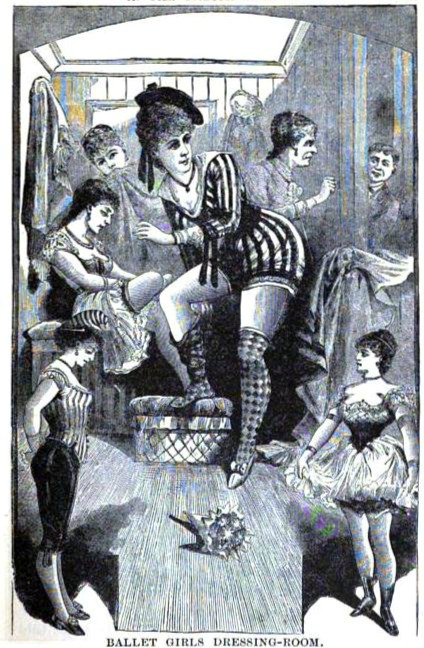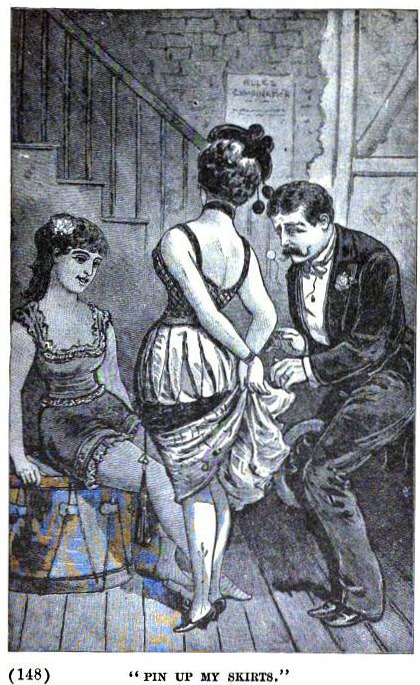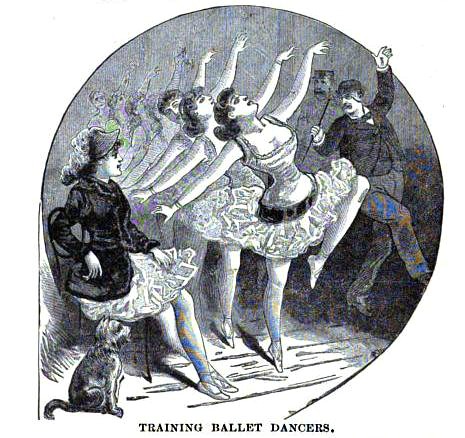Illustrations taken from John Joseph Jenning's Theatrical and circus life: or, Secrets of the stage, green-room and sawdust arena (1882)
Slip behind the swinging door of the Parisian theater and you will discover the coulisse, the performer's secret world of greasepaint, foot bindings, levers and pulleys. Off-limits to the ordinary audience member, this world has guarding its gate an incorruptible Cerberus. He will step aside only if you speak the name of M. le Directeur and present to him a passeport.
Once backstage what a welcome the visitor receives! A flurry of movement greets him. Huge balance weights swing overhead (their cords known to snap sometimes without notice), the tightly wrapped toes of pirouetting danseuses scissor the air. Musicians pace to and fro, humming snatches of the latest sonata. Actors grimace and puff their chests and declare their love in stentorian tones. White and soft as cream puffs, opera singers warm up with scales.
"And even this heart of mine has something artificial," laments Edgar Degas. "The dancers have sewn it into a bag of pink satin, pink satin slightly faded, like their dancing shoes."
Among these characters bustle admirers--ambassadors, ministers, deputies and marshals of France. They flit from performer to performer and gather thickly in front of the ballerinas' great gilded mirror. There three or four slim figures execute a "compasses manoeuvre" or some other complex step, refining their choreography unto exhaustion.

Inspiration for this post comes from "At the Coulisses in Paris" (1857)
Exhausted, the ballerina gathers herself to practice some more. The coulisse brightly lit and cacophonous, the coulisse dark and silent--both she experiences as she practices round the clock. Rich and poor dancers practice side by side, but equality ends there. Any ballerina guilty of an error during performance--say, skipping a step or missing a cue--must pay the
directeur a heavy fine, which he garnishes from her weekly wages.
"The Bat Theater players were dispersed by the Bolshevist revolution," a 1922 edition of New Outlook reports. "[ Many] of them fled as refugees to Paris, where they were stranded--literally 'on their uppers.'"
This sanction falls hardest on a dancer of modest means. Perfection alone spares her purse, so she rehearses for hours, permitting only injury to interrupt her endless pirouettes and pliés, cabrioles and relevés. Then she must rest and allow the theater medical officer to minister to a sprained ankle, a mashed toe or inflamed nostrils.

Such a rigorous schedule leaves the ballerina little time for nourishment. At those odd moments when she can replenish herself, she prefers eau sucré or a glass of diluted Madeira. If an evening of demi-voltes awaits her, she sips a chilled soup
An article in a 1919 issue of Good Housekeeping observes that on a hot summer day "the palate craves something icy cold, but hot and piquant as to seasoning that it may also serve as an appetizer for the dinner to follow. For this purpose cold jellied soup seems exactly to 'fill the bill.'"
, brought to her by her sister or mother, who wait in the wings. If the show has been difficult, she will fall into her mother's arms with an anguished cry: "O, mother! how I suffer!" A mouthful of broth and a moment's rest, however, see her to the next scene. The show must go on....


